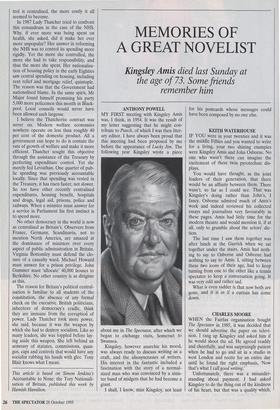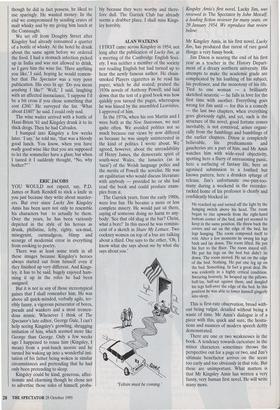MEMORIES OF A GREAT NOVELIST
Kingsley Amis died last Sunday at
the age of 73. Some friends remember him
ANTHONY POWELL MY FIRST meeting with Kingsley Amis was, I think, in 1954. It was the result of my letter suggesting that he might con- tribute to Punch, of which I was then liter- ary editor. I have always been proud that this meeting had been proposed by me before the appearance of Lucky Jim. The following year Kingsley wrote a piece about me in The Spectator, after which we began to eichange visits, Somerset to Swansea.
Kingsley, however anarchic his mood, was always ready to discuss writing as a craft, and the idiosyncrasies of writers. His interest in the fantastic included a fascination with the story of a normal- sized man who was convinced by a sinis- ter band of midgets that he had become a giant.
I shall, I know, miss Kingsley, not least for his postcards whose messages could have been composed by no one else.
KEITH WATERHOUSE IF YOU were in your twenties and it was the middle Fifties and you wanted to write for a living, your two shining examples were Kingsley Amis and John Osborne. No one who wasn't there can imagine the excitement of these twin pyrotechnic dis- plays.
You would have thought, as the joint leaders of their generation, that there would be an affinity between them. There wasn't, so far as I could see. That was Kingsley's doing rather than John's, I fancy. Osborne admired much of Amis's work and indeed reviewed his collected essays and journalism very favourably in these pages. Amis had little time for the modern theatre and would mention it, if at all, only to grumble about the actors' dic- tion.
The last time I saw them together was after lunch at the Garrick when we sat together under the stairs. Amis had noth- ing to say to Osborne and Osborne had nothing to say to Amis. I, sitting between these two icons of their age, had to keep turning from one to the other like a tennis spectator to keep a conversation going. It was very odd and rather sad.
What is even sadder is that now both are gone, and it is as if a curtain has come down.
CHARLES MOORE
WHEN the Fairfax organisation bought The Spectator in 1985, it was decided that we should advertise the paper on televi- sion. I rang up Kingsley and asked him if he would shoot the ad. He agreed readily and cheerfully, and was surprisingly patient when he had to go and sit in a studio in west London and recite for an entire day until he found the right emphasis, 'Now that's what I call good writing.'
Unfortunately, there was a misunder- standing about payment. I 'had asked Kingsley to do the thing out of the kindness of his heart, but that was a quality which, though he did in fact possess, he liked to use sparingly. He wanted money. In the end we compromised by sending crates of malt whisky and by my giving him lunch at the Connaught.
We set off from Doughty Street after Kingsley had already consumed a quarter of a bottle of whisky At the hotel he drank about the same again before we ordered the food. I had a stomach infection picked up in India and was not allowed to drink, so I gave him the wine list. 'Have anything you like,' I said, hoping he would remem- ber that The Spectator was a very poor publication. His eyes lit up: `Do you mean anything I like?' Well,' I said, laughing with an affected insouciance, 'I suppose I'd be a bit cross if you chose something that cost £260.' He surveyed the list. 'What about £160?' he said. I could only nod.
The wine waiter arrived with a bottle of Haut-Brion '61 and Kingsley drank it to its thick dregs. Then he had Calvados.
I bumped into Kingsley a few weeks later. 'I say,' he told me, 'that was a bloody good lunch. You know, when you have really good wine like that you are supposed to let the sommelier have a glass; but when I tasted it I suddenly thought, "No, why bother?"' ERIC JACOBS YOU WOULD not expect, say, P.D. James or Ruth Rendell to stick a knife in you just because they write about murder- ers. But ever since Lucky Jim Kingsley Amis has been seen not only to resemble his characters but to actually be them. Over the years, he has been variously depicted in the style of his heroes as drunk, philistine, lefty, righty, sex-mad, misogynist, curmudgeon, blimp and scourge of modernist error in everything from cooking to poetry.
There was at least some truth in all these images because Kingsley's heroes always started out from himself even if they finished up very different. And Kings- ley, it has to be said, hugely enjoyed ham- ming it up in the roles he had been assigned.
But it is not in any of those stereotypical guises that I shall remember him. He was above all quick-minded, verbally agile, ter- ribly funny, a vigorous persecutor of bores, pseuds and wankers and a most tremen- dous mimic. Whenever I think of The Spectator's late editor, George Gale, I can't help seeing Kingsley's growling, shrugging imitation of him, which seemed more like George than George. Only a few weeks ago I happened to rouse him (Kingsley, I mean) from a post-lunch snooze and he turned his waking up into a wonderful imi- tation of his father being woken in similar circumstances and pretending that he had only been pretending to sleep.
Kingsley could be kind, generous, affec- tionate and charming though he chose not to advertise those sides of himself, proba- bly because they were worthy and there- fore dull. The Garrick Club bar already seems a drabber place. I shall miss Kings- ley horribly.
ALAN WATKINS I FIRST came across Kingsley in 1954, not long after the publication of Lucky Jim, at a meeting of the Cambridge English Soci- ety. I was neither a member of the society nor reading English but had turned up to hear the newly famous author. He chain- smoked Players cigarettes as he read his paper, which he did seated; praised the 1930s novels of Anthony Powell; and laid down that the test of a good book was how quickly you turned the pages, whereupon he was hissed by the assembled Leavisites. I approved of him. In the 1970s, when his son Martin and were both at the New Statesman, we met quite often. We avoided politics not so much because our views by now differed as because he was simply uninterested in the kind of politics I wrote about. We agreed, however, about the unreadability of Henry James, the democratic spirit of south-west Wales, the lunacies (as in lacsi') of the Welsh language police and the merits of Powell the novelist. He was an egalitarian who would discuss literature with anybody — provided he or she had read the book and could produce exam- ples from it.
The Garrick years, from the early 1980s, were less fun. He became a more or less complete misery. He would just sit there, saying of someone doing no harm to any- body: 'See that old shag at the bar? Christ, what a bore!' In this mood he was reminis- cent of a sketch in Share My Lettuce. Two cockney women on top of a bus are talking about a third. One says to the other, 'Oh, I know what she says about me by what she says about you.'
Teltsin must be coming.' Kingsley Amis's first novel, Lucky Jim, was reviewed in The Spectator by John Metcalf, a leading fiction reviewer for many years, on 29 January 1954, We reproduce that review below: Mr Kingsley Amis, in his first novel, Lucky Jim, has produced that rarest of rare good things: a very funny book.
Jim Dixon is nearing the end of his first year as a teacher in the History Depart- ment of a dreary northern university. His attempts to make the academic grade are complicated by his loathing of his subject, his professor, and the monotony of his life. Tied to one woman — a brilliantly sketched neurotic — he falls in love for the first time with another. Everything goes wrong for Jim until — for this is a comedy — the last two chapters, when everything goes gloriously right, and yet, such is the structure of the novel, good fortune comes inevitably, is not contrived, arises organi- cally from the fumblings and bumblings of the earlier chapters. Dixon is completely believable, his predicaments and gaucheries are a part of him, and Mr Amis watches him with wide-eyed objectivity, spotting here a flurry of unreasoning panic, here a surfacing of fantasy life, here an agonised submission to a loathed but known pattern, here a drunken splurge of release. Jim's unfortunate one-pint-too- many during a weekend in the recorder- racked home of his professor is clearly and confidently blocked in: He reached up and turned off the light by the hanging switch above his head. The room began to rise upwards from the right-hand bottom corner of the bed, and yet seemed to keep in the same position. He threw back the covers and sat on the edge of the bed, his legs hanging. The room composed itself to rest. After a few moments he swung his legs back and lay down. The room lifted. He put his feet to the floor. The room stayed still. He put his legs on the bed but didn't lie down. The room moved. He sat on the edge of the bed. Nothing. He put one leg up on the bed. Something. In fact a great deal. He was evidently in a highly critical condition. Swearing hoarsely, he heaped up the pillows, half-lay, half-sat against them, and dangled his legs half-over the edge of the bed. In this position he was able to lower himself gingerly into sleep.
This is first-rate observation, broad with- out being vulgar, detailed without being a waste of time. Mr Amis's dialogue is of a piece with this, quick and sure, the hesita- tions and nuances of modern speech deftly demonstrated.
There are one or two weaknesses in the book. A tendency towards caricature in the minor characters sometimes throws the perspective out for a page or two, and Jim's ultimate benefactor arrives on the scene too early and too obviously in that role. But these are unimportant. What matters is that Mr Kingsley Amis has written a very funny, very human first novel. He will write many more.



































































 Previous page
Previous page